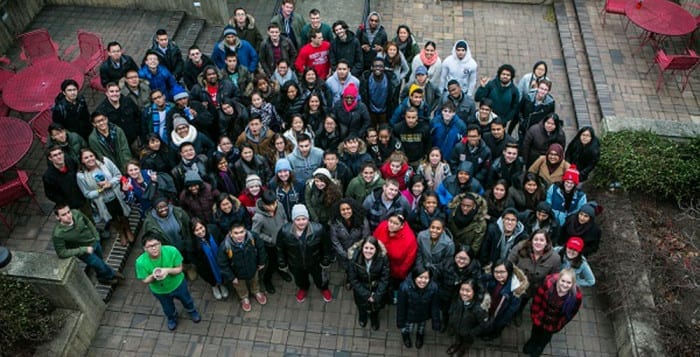Student employment spikes at Stony Brook University
Stony Brook University is putting its students to work both inside and outside the classroom.
The university announced this week that it was turning up the heat at its on-campus dining services, where student payroll wages went up 32 percent thanks to an employment increase of 22 percent over the past year. The school has made on-campus hiring a greater priority over the past year, a spokeswoman said, because of research studies stating that it not only helped them raise money, but become better students as well.
Research from the U.S. Bureau of Labor Statistics confirmed that part-time campus jobs not only raise cash, but also can help raise students’ grade-point averages. Campus dining services student employees collectively earned $663,912 – earning a competitive average wage of $9.40 per hour – and maintained an average 3.27 GPA during the fall 2015 semester, Stony Brook University said in a statement.
“We applaud campus dining for taking this approach as these student employees will develop transferrable skills that can apply in a variety of work environments and position students for career-relevant internships and full time jobs,” said Marianna Savoca, director of the career center at Stony Brook. “The career center works with hundreds of employers from every industry sector — they want candidates with workplace skills and experience — and that’s what our student employment program aspires to create.”
More than 220 students were on campus last week for on-site training for various positions they will occupy over the coming year — and they’re still hiring, the university said.
The university’s campus dining services employed more than 450 students in the fall of 2015, a spokeswoman for the university said. Over the past year, Stony Brook students worked an average of 22 hours each week across various positions that go beyond just the kitchens and dining spots, the spokeswoman said.
“They work in marketing, social media, event planning and Web, and often interact directly with managers, chefs, university personnel and the public,” the spokeswoman said in a statement.
“Working for campus dining has allowed me to improve my communication skills with customers, staff, and teammates, all while giving me the freedom to use my creativity and experience to work towards a common goal,” said David Golden, a CDS marketing intern and business marketing major who plans to graduate in May 2017.
Campus dining services student employees receive thorough training in customer service, time management, food safety, communication, special food needs training and social media, the university said. A total of seven student employees have received AllerTrain food allergy training, and nearly 90 student employees have earned a Suffolk County Food Handler’s Certificate.
Kareema Charles is an example that a student position at Stony Brook can lead to a full-time job. After graduating from Stony Brook University with a degree in journalism, Charles was hired to serve as a management trainee helping to produce The Seawolves Food Show, an online video series developed by the University’s Faculty Student Association in collaboration with journalism students to help the campus community learn more about campus dining programs.
Prior to graduation, Charles worked as a student producer for The Seawolves Food Show.
“I never imagined that my student job would turn into a full time position after graduation,” said Charles. “Stony Brook’s School of Journalism gave me all the skills I needed for my current position, while the University’s Faculty Student Association gave me the opportunity to use those skills in a real world setting. Stony Brook made the transition from college life into every day work life really easy.”







